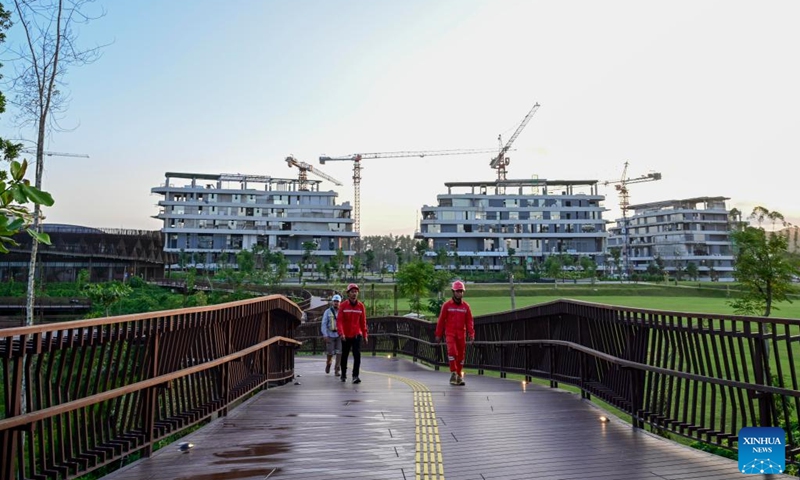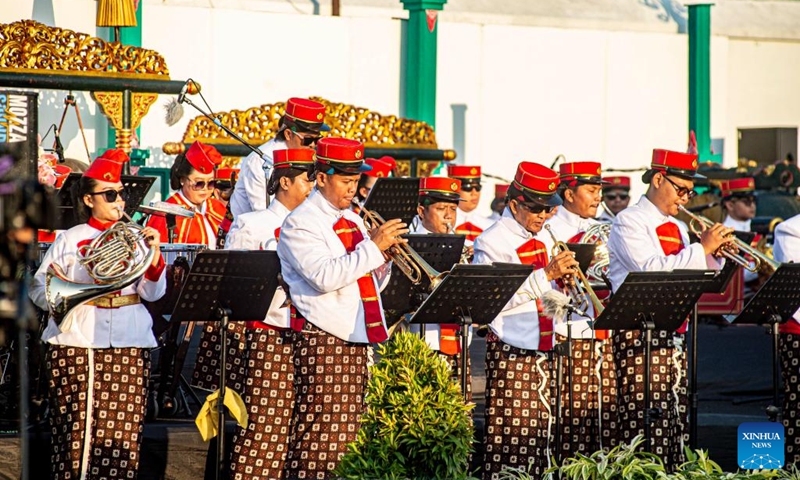
Workers walk near a construction site in the new capital Nusantara located in Kalimantan Island, Indonesia, July 28, 2024. Photo: Xinhua
As a Chinese-made Autonomous Rail Rapid Transit system (ART system) was showcased at Indonesia's 79th Independence Day celebrations in the new Indonesian capital of Nusantara over the weekend, industry experts said on Monday that the new system is poised to contribute to the country's green and digital drive.
The ART system, a collaboration project between China's NORINCO International and the CRRC Group, is holding a 60-day trial period.
The new capital calls for the development of green, high-tech and smart city technologies. The green and intelligent features of the ART system are highly consistent with the city's planning goals, effectively meeting its future transportation needs and providing support for sustainable development, NORINCO International said in a statement sent to the Global Times on Monday.
"We expect growing demand for modern transportation infrastructure as Indonesia's urbanization progresses," the company said, noting that it will continue to promote the ART system in the country and offer more flexible solutions to cater to varying needs in different cities.
Last week, Indonesian President Joko Widodo took a trial ride on the Chinese-developed ART system in Nusantara.
Analysts said that the ART system could provide a sustainable and cost-effective alternative to traditional rail systems in Indonesia, contributing to the development of global green transportation.
With a top speed of 80 kilometers per hour, the three-carriage vehicle can carry a maximum of 280 passengers. It scans the dimensions of a road with sensors. It is an urban transport system seen as a cross among a bus, train and tram.
Sun Zhang, a railway expert from Shanghai Tongji University, told the Global Times on Monday that trackless trams are one of the new development trends in rolling stock, and a number of Chinese cities are exploring their use due to the lower cost of construction and operation and flexibility compared with tracked trams.
The fact that these trains are traveling on an invisible track means the road can be safely shared by other vehicles, Sun said, noting that the new type of rolling stock can contribute to sustainable development if it meets the specific needs of social and economic development of the host city.
The ART system integrates advanced technologies such as virtual tracks, BeiDou navigation system, autonomous driving and pure-battery power, and it has already been commercially deployed in several Chinese cities and Abu Dhabi in the United Arab Emirates, according to NORINCO International.
NORINCO International and CRRC Group will continue to conduct trial operations of the ART system until October.
Experts said the development reflected growing bilateral cooperation on mass transportation and green development, with the Jakarta-Bandung High-Speed Railway (HSR) as the flagship project.
Since the start of commercial operations in October 2023, the Jakarta-Bandung HSR has delivered significant benefits to Indonesia, reducing the travel time between Jakarta and Bandung, and saving some 3.2 trillion rupiah ($197.56 million) in fuel costs annually by utilizing electric, the Xinhua News Agency reported in July, citing the Indonesian minister of state-owned enterprises.
The HSR had carried 4 million passengers as of early July, indicating strong public trust in and enthusiasm for Southeast Asia's first high-speed train, according to the official.




